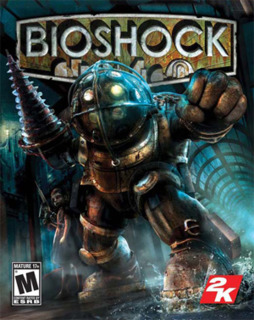Bioshock is a sunken treasure.
The game revolves around a simple, everyman style character. You're on a plane, bound for some location (presumably your home) when suddenly your plane crashes. Long story short, you find yourself in the middle of the Atlantic and are forced to visit the city of Rapture - a modern day Atlantis miles below sea level. At first glance, everything in the city appears to be ship-shape (pardon the pun). However, once you've entered the city, you realize that something has gone horribly wrong. What was once a shimmering utopia of human determination and will is now a giant tomb. Filled with violent, psychopathic residents who wish your death at every turn. You need to get out. And now.
The gameplay mechanics are fantastic. Aside from the standard point-and-shoot mechanism of most FPS's, Bioshock allows for the addition of "Plasmids" - superpowers, to put it simply. These allow your character to, say, shoot fire from your hands, or electricity or even...bees. That's right, you can shoot bees at your enemies. This allows for a whole new level of strategy in how to effectively kill your opponents. If seven of them are knee deep in a pool of water, rather than killing them with your rifle or pistol, just shoot some electricity in the water and BAM! Fried bad guys!
Another fantastic addition is the ability to upgrade and enhance your weaponry. As your progress through Rapture, your enemies become more used to how you attack and because of that, you need to adapt. Take your tommy gun to a "Power to the People" machine and get it augmented to fire, let's say, exploding bullets. That'll even the odds some. You can also enhance and upgrade your plasmids so that way, if you choose to, you can be a venerable Superman by the time you finish the game.
It's needless to say that the game looks beautiful. The graphics and design of this game are flawless. Everything moves smoothly without a single missed frame, even when multiple enemies are on screen. Loading times are a pain in any game, but in Bioshock, they are a well deserved breather (as you'll be spending a lot of your time scared to death). The lighting effects are brilliant. Everything from thunderbolts to gunshots are crafted precisely and smoothly. Not to mention, the design of Rapture itself is mind-boggling. You'll want to spend hours exploring this sunken city.
The sound design is also remarkable. Every footstep, every punch, every gunshot is crystal clear. The game is especially wonderful in Dolby. You can hear distant conversations, footsteps of enemies trying to flank you as well as all of the ever important plot pieces you so often miss in first person shooters. But it is not in the game play, graphics or sound that Bioshock is revolutionary. It is revolutionary due to its stellar narrative. The story of the game is so engrossing, so captivating that it's almost impossible to turn off the game. Most games like to make use of cut scenes or FMVs in order to move a plot along, but in Bioshock everything is presented as you're playing. As if it's real life, playing out in front of you. And it is that narrative that makes Bioshock as terrifying as it is fascinating to play.
In short, Bioshock is an amazing adventure that no gamer should go without. You wanted your excuse to buy a 360? Here it is. A solid first-person shooter with an amazing story and great game play. It looks great, sounds great and most importantly, it proves that a video game can become a work of art. Take that, Roger Ebert.

